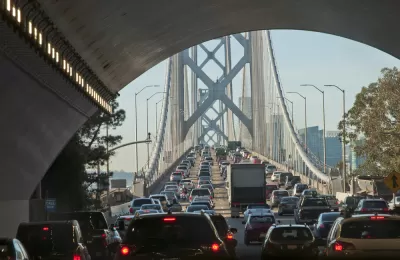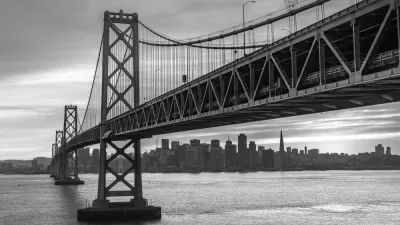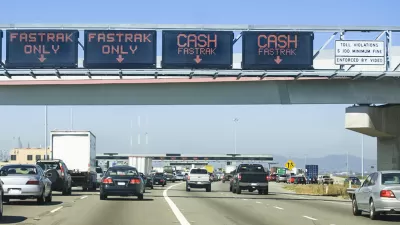A total of $4.5 billion in road and transit projects was at stake in a state taxpayer group's lawsuit against a regional ballot measure approved by voters in June 2018.

"A San Francisco Superior Court judge has tossed a lawsuit filed last year to block the use of voter-approved toll increases on the Bay Area’s state-owned bridges to pay for regional transportation and public transit upgrades, paving the way for $4.5 billion in projects to move ahead," reports Kevin Fixler for The Press Democrat, on April 8.
Last week [April 3], Judge Ethan P. Schulman dismissed the suit filed in July against the Bay Area Toll Authority [BATA] and California Legislature by the Howard Jarvis Taxpayers Association [HJTA].
The judge sided with lawmakers who drafted the framework allowing Regional Measure 3 to land on June’s ballot in the nine Bay Area counties and the toll operator that oversees collections in affirming the toll hikes are a fee rather than a tax that would have needed a greater percentage of voter approval to pass under state law.
The ballot measure, based on Senate Bill 595 by Sen. Jim Beall (D-San Jose), passed with 55 percent of the vote on June 5. It raised the base toll on seven, state-owned bridges by $1 to $6 on Jan. 1. Additional $1 toll increases will go into effect on Jan. 1, 2022, and on Jan. 1, 2025.
However, due to the lawsuit by HJTA and a second one filed by a private citizen in August [see page 15 of 32 of BATA memo (pdf)], the additional toll revenues were "held in escrow ... until the resolution of the lawsuits,” John Goodwin, a spokesperson for the toll authority and its parent agency, the Metropolitan Transportation Commission, told CBS News on Jan. 1.
And that's another reason why transportation officials are breathing easier – the extra dollar paid by every toll-paying motorist as of New Years Day would have to be refunded had the Metropolitan Transportation Commission lost the suit. The CBS news reporter instructed commuters to ask for receipts if paying the new toll with cash. Another reason to use FastTrak, he noted.
A toll is not a tax
Unlike the recent outcome of a high-profile lawsuit in Rhode Island on highway tolls, Judge Schulman ruled that bridge tolls, unlike transportation sales taxes, need only pass with a majority vote (explained in more detail by Joe Fitzgerald Rodriguez of the San Francisco Examiner), and the same held true for the legislature's approval of SB 595 in September 2017.
An earlier post described the two reasons given by Tim Bittle, director of legal affairs for the Howard Jarvis Taxpayers Association, why they believed the toll increase qualified as a tax. Motorists wouldn't directly benefit since most toll revenue would go toward transit projects, and the applicability of the measure to Proposition 26 and Proposition 218. Both propositions are offshoots of the landmark 1978 Proposition 13 which set the original two-thirds threshold for local tax hikes.
Appeal unlikely
"On Monday morning, Bittle told the San Francisco Examiner that it is unlikely the association would appeal the decision as they view the risk as too high," according to Rodriguez.
“We lost,” he said. “We’re nervous about the decision. We’re afraid if we lost on appeal and got a published appellate decision, that could open a new loophole that state and local governments would drive a truck through.”
"Barring an appeal during a 60-day window after the court’s final ruling is submitted Tuesday or Wednesday, it stands to allow transportation agencies throughout the Bay Area to begin receiving toll revenue for highway and bridge upgrades, as well as commuter bus and rail expansions," adds Fixler.
The largest recipients in the toll measure's expenditure plan [pdf] are BART expansion cars ($500 million), BART to San Jose phase 2 ($375 million), and Caltrain downtown San Francisco extension, $325 million.
According to an email from MTC's Goodwin, the second lawsuit, "Randall Whitney v. Metropolitan Transportation Commission, is still pending in San Francisco Superior Court. MTC will pursue dismissal of this suit as well."
-
Ballot Measure to Hike Bay Area Bridge Tolls Headed for June Ballot, January 14, 2018
Hat tip to MTC News Headlines.
FULL STORY: San Francisco judge clears way for Bay Area bridge toll hikes for regional transportation upgrades

Study: Maui’s Plan to Convert Vacation Rentals to Long-Term Housing Could Cause Nearly $1 Billion Economic Loss
The plan would reduce visitor accommodation by 25,% resulting in 1,900 jobs lost.

Alabama: Trump Terminates Settlements for Black Communities Harmed By Raw Sewage
Trump deemed the landmark civil rights agreement “illegal DEI and environmental justice policy.”

Why Should We Subsidize Public Transportation?
Many public transit agencies face financial stress due to rising costs, declining fare revenue, and declining subsidies. Transit advocates must provide a strong business case for increasing public transit funding.

Paris Bike Boom Leads to Steep Drop in Air Pollution
The French city’s air quality has improved dramatically in the past 20 years, coinciding with a growth in cycling.

Why Housing Costs More to Build in California Than in Texas
Hard costs like labor and materials combined with ‘soft’ costs such as permitting make building in the San Francisco Bay Area almost three times as costly as in Texas cities.

San Diego County Sees a Rise in Urban Coyotes
San Diego County experiences a rise in urban coyotes, as sightings become prevalent throughout its urban neighbourhoods and surrounding areas.
Urban Design for Planners 1: Software Tools
This six-course series explores essential urban design concepts using open source software and equips planners with the tools they need to participate fully in the urban design process.
Planning for Universal Design
Learn the tools for implementing Universal Design in planning regulations.
Smith Gee Studio
Alamo Area Metropolitan Planning Organization
City of Santa Clarita
Institute for Housing and Urban Development Studies (IHS)
City of Grandview
Harvard GSD Executive Education
Toledo-Lucas County Plan Commissions
Salt Lake City
NYU Wagner Graduate School of Public Service





























